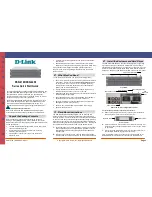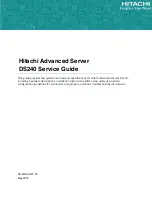
Hardware options installation 57
Advanced Memory Protection options are configured in the BIOS/Platform Configuration (RBSU). If the
requested AMP mode is not supported by the installed DIMM configuration, the server boots in Advanced
ECC mode. For more information, see the
HP UEFI System Utilities User Guide for HP ProLiant Gen9 Servers
on the HP website (
http://www.hp.com/go/ProLiantUEFI/docs
).
Maximum capacity
DIMM type
DIMM rank
Total capacity
RDIMM
Single-rank (4 GB)
32 GB
RDIMM
Single-rank (8 GB)
64 GB
RDIMM
Dual-rank (16 GB)
128 GB
LRDIMM
Quad-rank (32 GB)
256 GB
RDIMM
Dual-rank (32 GB)
256 GB
For the latest memory configuration information, see the product QuickSpecs on the HP website
(
http://www.hp.com/go/qs
).
Advanced ECC memory configuration
Advanced ECC memory is the default memory protection mode for this server. Standard ECC can correct
single-bit memory errors and detect multi-bit memory errors. When multi-bit errors are detected using
Standard ECC, the error is signaled to the server and causes the server to halt.
Advanced ECC protects the server against some multi-bit memory errors. Advanced ECC can correct both
single-bit memory errors and 4-bit memory errors if all failed bits are on the same DRAM device on the DIMM.
Advanced ECC provides additional protection over Standard ECC because it is possible to correct certain
memory errors that would otherwise be uncorrected and result in a server failure. Using HP Advanced
Memory Error Detection technology, the server provides notification when a DIMM is degrading and has a
higher probability of uncorrectable memory error.
Online Spare memory configuration
Online spare memory provides protection against degraded DIMMs by reducing the likelihood of
uncorrected memory errors. This protection is available without any operating system support.
Online spare memory protection dedicates one rank of each memory channel for use as spare memory. The
remaining ranks are available for OS and application use. If correctable memory errors occur at a rate
higher than a specific threshold on any of the non-spare ranks, the server automatically copies the memory
contents of the degraded rank to the online spare rank. The server then deactivates the failing rank and
automatically switches over to the online spare rank.
Mirrored memory configuration
Mirroring provides protection against uncorrected memory errors that would otherwise result in server
downtime. Mirroring is performed at the channel level. Channels 1 and 2 are used; channel 3 is not
populated.
Data is written to both memory channels. Data is read from one of the two memory channels. If an
uncorrectable error is detected in the active memory channel, data is retrieved from the mirror channel. This
channel becomes the new active channel, and the system disables the channel with the failed DIMM.
















































